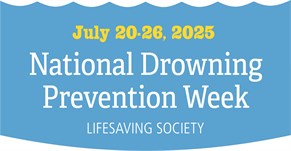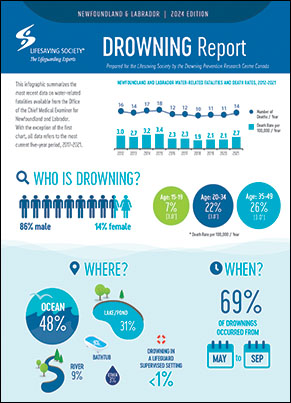The Lifesaving Society designates the third week in July
(July 20-26, 2025) as National Drowning Prevention
Week (NDPW) to focus community and media attention on the drowning
problem and drowning prevention.
NDPW provides a focus around which community Water Smart®
educators can plan news releases, do television and radio
interviews, and deliver public demonstrations and other events.
Many successful community events are launched with a Mayor's
Proclamation of Drowning Prevention Week.
:::

This year, the theme is Safer Together.
We'll be sharing messaging about topics like parents staying within
arms' reach of their young children, swimming where the lifeguards
are, and the importance of not swimming or boating alone.
NDPW is better together, so we're asking you, our partners, to
share our messages and data throughtout the week to educate your
communities and help save lives. There are a variety of ways to get
involved:
World Drowning Prevention Day falls during NDPW! Learn more
about World Drowning Prevention day below.
Social Media
Throughout NDPW, the Lifesaving Society Newfoundland and
Labrador will be active on social media. We encourage you to
interact with our branch on all of our social media platforms as
well as the Lifesaving Society nationally.
Facebook: Lifesaving Society Newfoundland and
Labrador
Instagram: @lifesavingsocietynl
If you'd like to create your own posts for the week, feel free
to use repost media and copy provided on our socials and be sure to
include the #NDPW2025 and
#SNPN2025 hashtags.
World drowning prevention day
The World Health Organization (WHO) recognizes World Drowning
Prevention Day on July 25, which falls during NDPW. This global advocacy event
serves as an opportunity to highlight the tragic and profound
impact of drowning on families and communities and offer lifesaving
solutions to prevent it. Learn more about World
Drowning Prevention Day here.
Some actions you can consider taking to participate in this
movement are:
- Wearing blue
- Reaching out to your local municipality or local businesses to
illuminate notable landmarks in blue light (and let us know about it!)
- Using #DrowningPrevention on social
media
Resources
Use these resources to help your community plan for,
and participate in National Drowning Prevention Week.
The themes are suggestions for how you can target your NDPW
campaign. They use specific messages to address trends seen in
Lifesaving Society drowning reports and the data from the Drowning
Prevention Research Centre. Use the key messages on social media in
combination with NDPW hastag - #ndpw2025 /
#snpn2025
Main Messages to Emphasize
The main messages below were selected because of the major risk
factors presented in the Newfoundland and Labrador Drowning Report - 2024
Edition.
- If you're not within arms' reach, you've gone too far. Always
supervise children.
- Boat sober. Alcohol consumption is a factor in almost 26% of
boating-related fatalities.
- Choose It. Use It. Always wear a Lifejacket or PFD.
- Lifejackets don't work if you don't wear them. Not wearing a
Lifejacket or PFD was a factor in 67% of boating deaths.
- Over 400 Canadians die in preventable water-related incidents
annually. Even one drowning is one too many.
:::

Learn to Swim
Basic swimming ability is a fundamental requirement in any
meaningful attempt to eliminate drowning in Canada. The Lifesaving
Society offers training programs from learn-to-swim through advanced lifesaving, lifeguarding and leadership.
Our Swim for
Life program stresses lots of in-water practice to develop
solid swimming strokes and skills. We incorporate valuable Water
Smart® education that will last a lifetime.
Swim to
Survive is a Lifesaving Society survival training program. Swim
to Survive is not a subsititute for swimming lessons; instead, it defines the
minimum skills needed to survive an unexpected fall into deep
water. People of all ages should be able to perform the Society's
Swim to Survive standard.